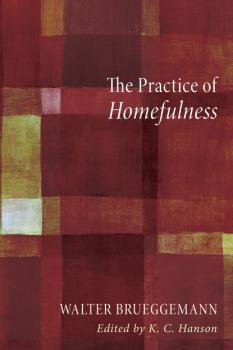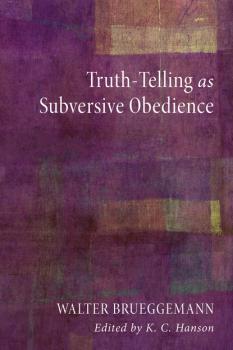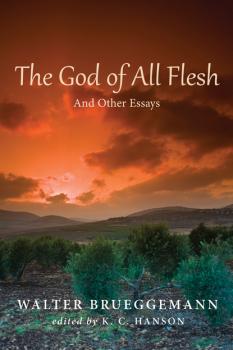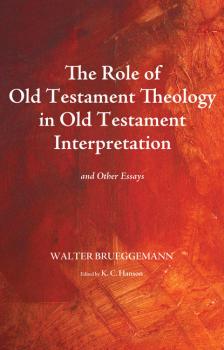Walter Brueggemann
Список книг автора Walter BrueggemannSocial Criticism and Social Vision in Ancient Israel
Contents 1. Social Criticism and Social Vision in the Deuteronomic Formula of the Judges 2. A Poem of Summons (Isa 55:1-3), a Narrative of Resistance (Dan 1:1-21) 3. Psalms 9-10: A Counter to Conventional Social Reality 4. Prophetic Imagination toward Social Flourishing 5. A Royal Miracle and Its Nachleben 6. The Living Afterlife of a Dead Prophet: Words That Keep Speaking 7. The Tearing of the Curtain: Matthew 27:51 8. Five Strong Rereadings of the Book of Isaiah
Into Your Hand
This set of seven sermons follows the traditional church sequence of «The Seven Last Words of the Cross,» utterances that the gospel narratives place on the lips of Jesus. These utterances are drawn from the several gospel narratives. In the liturgical life of the church, however, the sequence has a significance and staying power of its own quite apart from the gospel narratives in which the utterances are embedded. These sermons take seriously the faith voiced by Jesus in his context of wretched abuse by the Roman Empire. They attempt, moreover, to connect that reality of faith and abuse in our contemporary world of concentrated, ruthless power. The intent of such sermons on Good Friday is to replicate for us in our context what such an interface of faith and abuse must have been like. These sermons were preached last Good Friday in the preacher's home congregation.
The Practice of Homefulness
Contents 1 The Practice of Homefulness 2 A Myriad of «Truth and Reconciliation» Commissions 3 Bragging about the Right Stuff 4 A Culture of Life and the Politics of Death 5 Elisha as the Original Pentecost Guy 6 The Stunning Outcome of a One-Person Search Committee 7 The Non-negotiable Price of Sanity 8 The Family as World-Maker
Praying the Psalms, Second Edition
In this thoroughly revised edition of a classic in spirituality, Walter Brueggemann guides the reader into a thoughtful and moving encounter with the Psalms. This new edition includes a revised text, new notes, and new bibliography.
"The movement and meeting of God with us is indeed a speech-event in which new humanness is evoked among us. Being attentive to language means cultivating the candid imagination to bring our own experience to the Psalms and permitting it to be disciplined by the speech of the Psalms. And, conversely, it means letting the Psalms address us and having that language reshape our sensitivities and fill our minds with new pictures and images that may redirect our lives." –from Chapter 3
Truth-Telling as Subversive Obedience
"Those who serve as truth-tellers in the church, like those who listen to the truth-telling in the church, are a mix of yearning and fearfulness, of receptiveness and collusion. In the end, the work of truth-telling is not to offer a new package of certitudes that displaces old certitudes. This truth to be uttered and acted, rather, is the enactment and conveyance of this Person who is truth, so that truth comes as bodily fidelity that stays reliably present to the pain of the world." –from the Preface
Remember You Are Dust
"Walter Brueggemann is the master of finding fresh and compelling dimensions of meaning in texts so familiar they barely scratch the surface of our consciousness. In this exciting collection, Brueggemann finds that when we admit we are dust, we can be liberated. Why? Because we are free from acting like God. We are free to choose obedience to the one living, true Sovereign. The idols lose their grip on us and we live faithfully and in authentic joy." –Ronald J. Allen, Christian Theological Seminary
"According to Walter Brueggemann, the autonomy, secularity, and individualism that characterize modernity have 'exiled' the contemporary believer. Always concerned with the manner in which one is to live in the world, he argues for a subversive imagination similar to that found in the biblical wisdom writings, the Psalms, and the Prophets. One comes away from this book both energized by the vision presented and challenged to make it a reality." –Dianne Bergant, Catholic Theological Union in Chicago
"There is a reason why Walter Brueggemann remains, for preachers and pastors, the most loved and trusted of all biblical scholars–and that is simply because he writes for us. In every season and heartbreak of life and ministry, he writes for us. And over the years, we have come to see that when Brueggemann goes to the text before God, with his signature passion, candor, and ferocious energy, he goes not for our enlightenment or edification, but for our life and for his. Read this book and take off your shoes, because you will enter onto holy ground." –Anna Carter Florence, Columbia Theological Seminary
Embracing the Transformation
"Like athletes, preachers carry inside them the voices of their most challenging coaches–people who have encouraged them to dig deeper, stretch farther, and more faithfully pursue their craft and calling. In these crystalline essays, Walter Brueggemann is that voice again, shaking us free of the dust of our own diminished expectations, bolstering our best instincts, and consistently pointing us toward a gospel that would make the powers and principalities tremble." –Scott Black Johnston, Senior Pastor, Fifth Avenue Presbyterian Church
"Richly informed by Scripture, this superb book is a must-read for preachers and, indeed, for laity who love the Word. Brueggemann's theological interpretation of the biblical text strikes the mind and heart and calls out the church as an alternative community to embrace the work of transformation God is doing in the world. Brueggemann's books always inform and inspire, but as I read this extraordinary text, I found myself over and over again giving thanks to God." –Tex Sample, Professor Emeritus of Church and Society, Saint Paul School of Theology
"In this splendid collection of essays, we encounter the Walter Brueggemann we have come to expect–wise, edgy, original, provocative, stimulating to preachers, and deeply encouraging to a church in quest of a prophetic, bold, and vital faith." –Thomas G. Long, Professor of Preaching, Candler School of Theology, Emory University
The God of All Flesh
Biblical faith is passionately and relentlessly material in its accent. This claim is rooted in the conviction that the creator God loves and cares for the creation and summons creation to be in sync with the will of the creator God. This collection of essays is focused on the bodily life of the world as it is ordered in all of its problematic political and economic forms. The phrase of the title, «all flesh,» in the flood narrative of Genesis 9, refers to all living creatures who are in covenant with God–human beings, animals, birds, and fish–as recipients of God's grace, as dependent upon Gods' generosity, and as destined for praise and obedience to God. The insistence on the materiality of life as the subject of the Bible means that the hard issues of economics and the demanding questions of politics are front and center in the text. So the Pentateuch pivots around the exodus narrative and the emancipation from an unbearable context of abusive labor practices. In like manner the prophets endlessly address such questions of social policy, and the wisdom teachers reflect on how to manage the material things of life and social relationships for the well-being of the community. This accent, pervasive in these essays, is a powerful alternative and a strong resistance against all of the contemporary efforts to transcend (escape!) the material into some form of the «spiritual.» All around us are efforts to find an easier, more harmonious faith. This may be evoked simply because life is «too hard,» or more ominously because of a desire to shield economic, political advantage from the inescapable critique of biblical faith. Such a temptation is a serious misreading of the Bible and a serious misjudgment about the nature of human existence. Thus the Bible addressed the most urgent issues of our day, and refuses the «religious temptation» that avoids lived reality where the power of God is a work.
The Role of Old Testament Theology in Old Testament Interpretation
This collection of essays is drawn from a series of previous collections to which the author has contributed that were designed to honor senior scholars in the discipline of Old Testament study. Each of these essays reflects a distinct intention depending on the nature of the original collection in which they appeared and the scholar who was being honored. Taken together, however, this collection amounts to an articulation of Brueggemann's distinctive approach to theological interpretation of the Old Testament. Already in his major volume on Old Testament theology, Brueggemann proposed a dynamism of tension, dispute, and contradiction as the text of ancient Israel sought to give voice to the mystery of God as a sustaining and disruptive agent in the life of the world. Over a long period of time, this collection reflects the author's growing clarity about the task of Old Testament theology. It further reflects on the nature of the biblical text and the way in which the God who inhabits the text runs beyond all of our attempts to define and explain. These essays reflect not so much on methodological issues, but take up the substantive questions that regularly occupied these ancient text-makers.
A Pathway of Interpretation
Writing with the pastor and student in mind, Walter Brueggemann provides guidance for interpreting Old Testament texts. He offers both advice for the interpreter as well as examples of working with different sorts of passages: from narratives, prophecies, and Psalms. He also demonstrates how to work thematically, drawing together threads from different traditions. His goal is to work through the rhetoric of these passages to reach toward theological interpretation. These investigations indicate Brueggemann's conviction that the process of moving from text to interpretive outcome is an artistic enterprise that can be learned and practiced.









